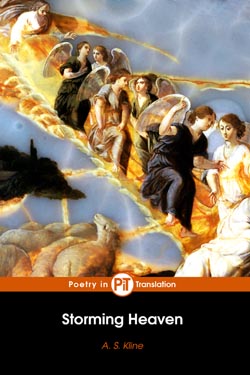Storming Heaven
A. S. Kline
Four Elizabethan lives
Through History, Literature, Myth and Idea
Essex, Marlowe, Raleigh, Donne

Contents
Nature, that fram'd us of four elements
Doth teach us all to have aspiring minds:
Our souls, whose faculties can comprehend
The wondrous architecture of the world,
And measure every wandering planet's course,
Still climbing after knowledge infinite
And always moving as the restless spheres,
Will us to wear ourselves, and never rest...
In pride, in reas'ning pride, our error lies;
All quit their sphere, and rush into the skies.
Pride still is aiming at the blest abodes,
Men would be angels, angels would be gods.
About This Work
Storming Heaven is an exploration of the lives of four outstanding individuals of the Elizabethan Renaissance: Essex, Marlowe, Raleigh and Donne. Each was to a greater or lesser degree a poet, though Essex and Raleigh were primarily men of action. While Essex and Marlowe are quintessential Elizabethans, Raleigh and Donne lived on beyond the Elizabethan period to see the beginnings of a new and stormy era leading to the English Civil War and beyond.
The mixture of biography, poetry, analysis, and historical narrative employed in the text, is designed to highlight the unique character and achievements of each, in the context of the greater ambitions and striving of their age. It makes use of theatrical elements of the period, including astrology and the employment of heightened language, as well as insights from our own period derived from anthropology and the history of religion, primarily the concept of the Goddess.
The lives of Donne, Raleigh and Marlowe show the close interrelation between poetry and contemporary events, and with that of Essex highlight the intense conflicts beneath the glittering surface of the age. Contrasting and complementing each other, in character and achievements, the four individuals exemplify the richness of thought and feeling within their society at a crucial moment in English history, out of which many elements of the modern age developed.
Authored by A. S. Kline © Copyright 2000, All Rights Reserved.
This work MAY be FREELY reproduced, stored and transmitted, electronically or otherwise, for any non-commercial purpose. Conditions and Exceptions apply.
Last Modified February 2000